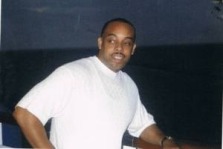Guilty Until Proven Innocent: In GPS Tracking Case, Judge Keeps Alive Drug Evidence

Police say nightclub manager Antoine Jones was the ringleader of a cocaine trafficking operation, and they had enough evidence to convince a jury he was guilty. There's just one problem: a key part of the government's case came from a GPS tracking device the police secretly attached to Jones' car. Jones argues that the installation and use of the device violated his Fourth Amendment rights. [MORE] From [HERE] Prosecutors in Washington this evening can rest easier. A judge declined to rule out as evidence the hundreds of thousands of dollars in cash and cocaine that the government wants to connect to Antoine Jones, the man who was at the center of the landmark GPS surveillance case in the U.S. Supreme Court.
The high court earlier this year voided the GPS data the government relied on at trial to link Jones to a drug stash house in Maryland. But that left open whether the government would be allowed to tell jurors all about the stuff that was found in the residence.
Ruling for the government this evening, U.S. District Judge Ellen Segal Huvelle said federal agents—a day before the installation of the tracking device in September 2005—determined the likely location of the drug house in Maryland. The judge's ruling is here.
Huvelle also said that even if Jones "could demonstrate a causal nexus between the GPS data and the location of the stash house," the government wins under the "inevitable discovery doctrine." The prosecution's evidence: $850,000 in cash and 97 kilograms of powder cocaine.
"After the GPS device was installed on Jones’ Jeep, law enforcement officers continued to obtain information from independent—and lawful—sources that confirmed that 9508 Potomac Drive was in fact the stash house," Huvelle wrote in her ruling.
The lawful sources, the judge said, included a wiretap and physical surveillance. The wiretap, the judge said, confirmed the FBI's belief that Jones was associated with a drug cartel.
Agents, Huvelle noted, also said they had video—from a stationary camera on the block that the authorities installed—showing Jones's travels to and from the house.
Huvelle rejected the argument from Jones's lawyer that "the unlawful GPS data is inextricably intertwined with the lawful investigative techniques" that federal agents used in the drug probe. The judge said the same argument was raised—and rejected—in a case in Michigan earlier this year.
Huvelle said she "has no trouble separating the lawful and unlawful investigative activities and is confident that law enforcement officials would have obtained a search warrant" for the house without the use of a GPS tracking device.
Last week, Huvelle delivered another win for the government in allowing cell-tower location records to be a part of the case. Jones's lawyer argued that prosecutors needed a warrant to first obtain the information from a service provider.
Huvelle didn't confront that question head-on, calling it a "vexing" area of Fourth Amendment law. Instead, she said federal agents acted in good faith when, via court orders, the government obtained the tower location from a provider.
Jones is scheduled to stand trial in January. He remains in federal custody. He faces a potential life sentence if he is convicted.